ISLAMABAD: Pakistan and United Kingdom on Tuesday expressed “satisfaction” over the legalities of the protocol pertaining to the exchange and transfer of prisoners between both the countries, hoping that the deal “would be signed shortly” – a development for which Islamabad has been trying to convince the British government for long.
Foreign Minister Shah Mahmood Qureshi and British Secretary of State for Foreign and Commonwealth Affairs, Jeremy Hunt, discussed this and a host of other issues over a telephone call.
“The two foreign ministers discussed a wide range of regional and bilateral issues of mutual interest and expressed satisfaction at the current state of relations,” a statement issued by the Ministry of Foreign Affairs read.
Pakistan also appreciated the expanded bilateral cooperation and stressed that the UK was an important trade and investment partner for the South Asian nation. “Brexit would open new opportunities for trade and development between the two countries,” Qureshi said.
The two foreign ministers agreed to hold the fourth round of talks as part of the Pakistan-UK Enhanced Strategic Dialogue in the first quarter of 2019 in London.
According to the statement, the two sides reaffirmed their commitment to enhance bilateral cooperation, particularly in the spheres of “regional security, counter-terrorism, organized crime, money-laundering and asset recovery.”
Prime Minister Imran Khan’s government has been trying to sign bilateral treaties with the UK and other countries in its pursuit to fight corruption and recover looted money stashed abroad.
As part of the effort, Pakistan’s federal cabinet last month approved plans to renew a prisoner exchange program with the UK and Northern Ireland. The Prisoner Exchange Treaty was part of an understanding reached between the two countries in September this year during British Home Secretary Sajid Javed’s visit to Islamabad.
Masroor Shah, a senior lawyer and expert on international law, said that the prisoner exchange treaty is a welcome move as this would help both the countries swap prisoners on “humanitarian grounds.”
“The treaty is also a tool of bilateral cooperation and this will help open other avenues of collaboration between both the countries,” he told Arab News. “The treaty will help facilitate the fair treatment and social rehabilitation of prisoners in their native countries.”
Shah, however, clarified that the deal is not equivalent to an extradition treaty. “Pakistan and UK does not have a formal extradition treaty, but even then Pakistan has extradited at least two persons so far to the UK through a bilateral arrangement,” he added.
He said that Pakistan’s anti-corruption institutions would not be able to bring back the wanted individuals residing in England in the absence of an extradition treaty.
Special Assistant to the Prime Minister, Mirza Shahzad Akbar told Arab News earlier this week that a bilateral treaty would be ratified with the UK in the coming months, besides enacting a Mutual Legal Assistance law to obtain evidence from foreign jurisdictions about financial crimes and corruption.
“We are also hopeful to sign an extradition treaty with the UK by March next year,” he said.
Tahir Malik, an expert on international affairs, expressed skepticism over Pakistan’s claim of signing the extradition treaty with the UK by March, saying that British parliamentarians and the civil society have repeatedly expressed concerns over Islamabad’s human rights record and treatment being meted out to religious minorities.
“UK parliamentarians fear that the extradition treaty, once signed with Pakistan, will be abused by seeking expatriation of political dissidents,” he told Arab News. “Until Islamabad addresses the legitimate human rights’ concerns of the international community, an extradition treaty with the UK won’t be possible.”
Pakistan, UK to sign prisoner exchange deal ‘shortly’
Pakistan, UK to sign prisoner exchange deal ‘shortly’

- Islamabad hopes to finalize treaty by March
- British parliamentarians fear it will be abused to repatriate political dissidents
No tension with Pakistan, US says after sanctioning firms for ‘aiding’ ballistic missile program
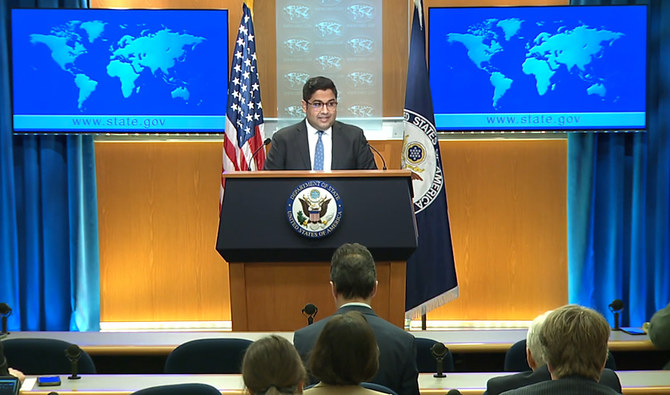
- US announced sanctions against three Chinese companies, one Belarus-based firm
- Washington says the firms were supplying items to Pakistan’s ballistic missile program
ISLAMABAD: The US State Department said on Thursday there were no tensions with Pakistan following Washington’s move to impose sanctions on four international firms for supplying to the South Asian nation’s ballistic missile program.
In a press release issued last Friday, the US State Department announced sanctions against three Chinese companies and one Belarus-based firm on charges they supplied items to Pakistan’s ballistic missile program.
Pakistan has said it rejects the “political use of export controls.”
“Absolutely not … Pakistan continues to be one of our most important partners in the region,” State Department Deputy Spokesperson Vedant Patel told reporters in response to a question about tensions between Washington and Islamabad following the sanctions.
“There continues to be a lot of cooperation that we have with the Government of Pakistan, especially in the security space, especially in the trade sector … This is a robust relationship and we’ll look to continue strengthening it.”
The companies listed by the US for sanctions are the China-based Xi’an Longde Technology Development Company Limited, Tianjin Creative Source International Trade Co. Ltd, Granpect Company Limited and Belarus-based Minsk Wheel Tractor Plant.
The sanctions mean all property and interests in property of the companies in the US or in possession or control of American citizens are blocked and must be reported to the US Treasury Department’s Office of Foreign Assets Control (OFAC), according to the State Department.
They also mean that all transactions by American citizens, or those within (or transiting) the US that involve any property or interests in property of the companies, are prohibited unless authorized by a general or specific license issued by OFAC.
Officials from global container logistics company in Pakistan for talks on developing ports
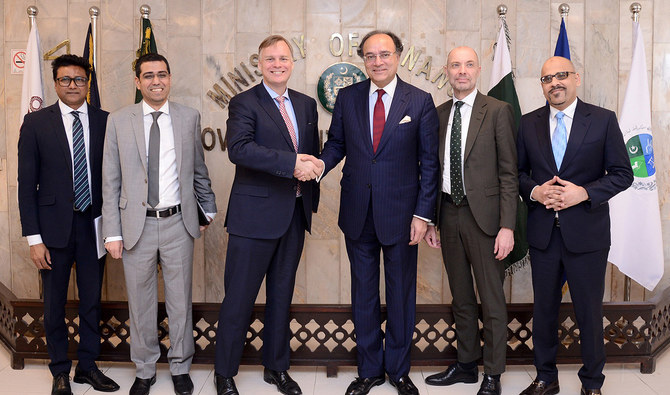
- Maersk is integrated container logistics company operating in 130 countries
- Company delegation meets Pakistani finance and maritime affairs ministers
ISLAMABAD: A delegation from a leading logistics company, A.P. Moller-Maersk (APM) Terminals, met Pakistani officials in Islamabad this week for talks on developing and modernizing the South Asian nation’s ports, state-run Radio Pakistan reported on Friday.
Maersk is an integrated container logistics company operating in 130 countries. APM Terminals has been developing and operating advanced ports and container terminals for over half a century and has 60 strategically located ports and container terminals around the globe and several more in development.
On Thursday, a delegation from the company led by its CEO Keith Svendsen separately met Pakistani Finance Minister Muhammad Aurangzeb and Minister for Maritime Affairs Qaiser Ahmed Sheikh.
“Pakistan is keen to explore future projects and investments with APM especially in the maritime sector,” Aurangzeb was quoted as telling the APM delegation in a report by Radio Pakistan. “The government is fully committed to facilitate an environment conducive to business and investments.”
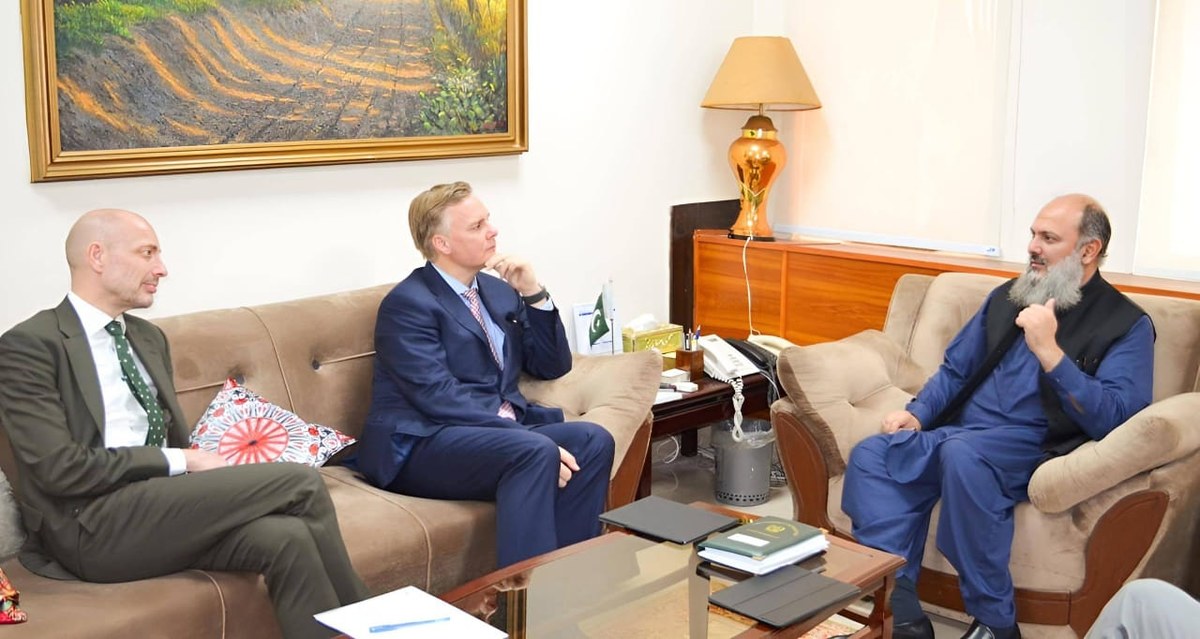
Radio Pakistan quoted Svendsen as telling Aurangzeb APM was “pleased” to engage with Pakistan and saw “great potential” in the Pakistani market.
“Affirming confidence in the country’s growth prospects and development agenda, he expressed commitment to enhance its investment and operations to support the country’s trade,” the report said.
Svendsen and his delegation also met the maritime affairs minister and discussed investment prospects in Pakistan’s ports and terminals sector.
“The delegation head highlighted Moller-Maersk’s prominent global position and its robust relationship with Pakistan, which reflects a market share of approximately 20 percent in containerized import-export activities,” Radio Pakistan said.
“Recognizing the immense growth potential, Keith Svendsen proposed investments to enhance integrated supply chain solutions, including the upgrading of ports and logistics infrastructure. The delegation pledged support for the advancement of maritime affairs in Pakistan and for nurturing a skilled workforce in this sector.”
On Monday, Pakistani and United Arab Emirates (UAE) officials performed the groundbreaking of a $175 million Bulk and General Cargo terminal as part of a new 25-year concession agreement signed between AD Ports Group and Karachi Port Trust (KPT) in Feb. 2024 to outsource operations of the terminal.
Under the terms of the agreement, Karachi Gateway Terminal Multipurpose Limited (KGTML), a joint venture between AD Ports Group, as a majority shareholder, and Kaheel Terminals, a UAE-based company, will develop, operate and manage the Bulk and General Cargo Terminal, berths 11 to 17 at Karachi Port’s East Wharf.
Pakistani PM to attend Islamic Summit Conference in Gambia on May 4
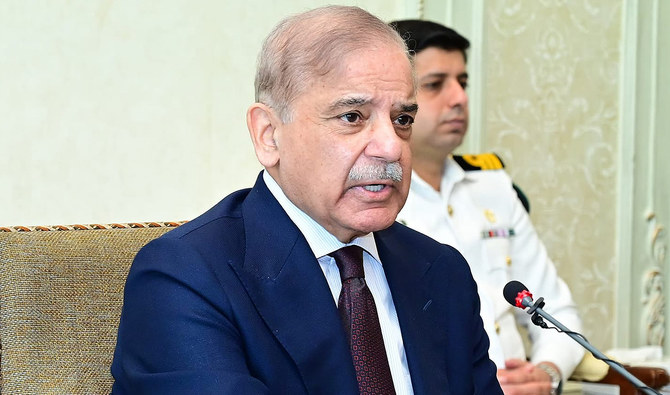
- Palestine, Islamophobia, climate change on agenda of meeting arranged by OIC
- Summit to be attended by concerned heads of state such as PMs, presidents, emirs
ISLAMABAD: Pakistani Prime Minister Shehbaz Sharif will attend the 15th session of the Islamic Summit Conference organized by the OIC on May 4-5 in the Gambian capital of Banjul to discuss a variety of regional and global issues, including Palestine, Islamophobia, climate change and the status of minorities, state-run APP reported.
The session will be held under the slogan “Enhancing Unity and Solidarity through Dialogue for Sustainable Development,” according to a press release issued by the OIC General Secretariat.
The Islamic Summit Conference attended by Sharif will be preceded by a preparatory meeting of senior officials on April 30 and May 1, who will discuss the documents of the session and submit a report to a preparatory meeting of the Council of Foreign Ministers (CFM).
“The preparatory CFM meeting will be held on May 1-2 to consider the results of the senior officials meeting and in turn, submit its report to the Summit,” the OIC said.
Pakistani foreign minister Ishaq Dar will attend the CFM meeting.
“Leaders of the member states will discuss the political issues of the Islamic world, most notably the Palestinian cause, and the economic, humanitarian, social and cultural issues, in addition to the issues of youth, women, family, science and technology, information, Muslim communities and minorities in non-OIC member states, and legal matters,” the OIC said.
The Summit will also tackle issues related to hate speech and Islamophobia, the promotion of dialogue, climate change and food security.
“The 15th session will issue a final communique that includes the OIC positions on the issues submitted to the Summit, a resolution on Palestine and Al-Quds Al-Sharif, and the Banjul Declaration,” the OIC added.
The Islamic Summit is a principal organ of the OIC focused on the formulation, development, and implementation of decisions made by 57 member states. The Summit is attended by concerned heads of state such as prime ministers, presidents, emirs and other equivalent heads.
Hit repeatedly by floods in northwest Pakistan, 70-year-old to rebuild house for 10th time
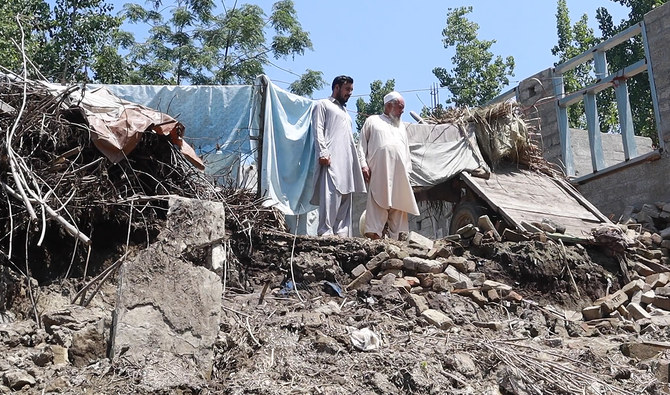
- Mian Awal Khan lives in Charsadda district, prone to floods after heavy rains
- 65 killed, 80 injured in heavy rains in Khyber Pakhtunkhwa province since Apr. 12
CHARSADDA, Pakistan: Mian Awal Khan stared at the remains of his house, destroyed by flooding in the River Khyali earlier this month, and cried quietly into his sleeve.
This is the 10th time the 70-year-old would have to rebuild his house in Charsadda, a district in Pakistan’s northwestern Khyber Pakhtunkhwa province prone to floods after heavy rains.
At least 65 people have been killed and 80 injured in downpours and subsequent flooding in KP since Apr. 12. Charsadda district is one of the worst hit, with three rivers, Jindi, Khyali and Kabul, meeting downstream at the Shahbara village.
Unfortunately for Khan, his house initially stood on the banks of the River Kyali and was first washed away by floods in 2010. He built a new house 500 meters away from that spot after the river carved out a path for itself on his land.
Flooding would destroy his house many times again.
“This will be the tenth time I will rebuild my house,” an emotional Khan told Arab News, seated on the concrete remains of his three-room house.
“My house was washed away by the floods six times when it was over there [initial spot] and four times when it was here.”
Khan’s 35-year-old son, Mian Fawadullah, said the family was unable to save any belongings on the day of the flooding.
“When we were busy rescuing our children and women, this [destruction] happened to our house,” he told Arab News. “We didn’t take any household items as our life was in danger. We left everything just as it was in its place.”
The flood had cost the family Rs1.5-1.6 million [$5,385-$5,744], Fawadullah said, and also destroyed 108,900 square feet of fields as well as washed away livestock and filled the fields with mud at a critical time for farming.
“Farming has also vanished now,” he lamented. “The wheat and the sugarcane have rotten in the water. This is a real mess. We do labor, prepare the field and the river washes it away [every single time].”
“EATEN MY YOUTH”
Flood survivors say they want the government to build protection walls and put in place preventative mechanisms in a country consistently ranked among the most affected by climate change impacts.
Unprecedented rains in 2022 triggered flash floods that killed over 1,700 people and caused damages worth $33 million.
Ihsan Dawar, a public relations officer at the KP Provincial Disaster Management Authority, said the government was carrying out relief works, particularly to rebuild around 3,500 houses partially or fully damaged in the recent floods.
“Up until this time, about Rs200 million [$718,096] have been distributed among the victims of the fresh spell of rain incidents,” Dawar told Arab News.
But Khan has little hope floods won’t wreak havoc on his life again.
“The river is not going to spare it [my house] here also,” he said, adding that it was cutting at the edges of the land like a “butcher cutting meat.”
When asked what he would do now, he broke down and cried quietly.
“This is too difficult,” he said about having to rebuild his house yet again. “It has eaten all my youth.”
He was ‘joyous’ in Australia, says family of Pakistani guard killed in Sydney attack
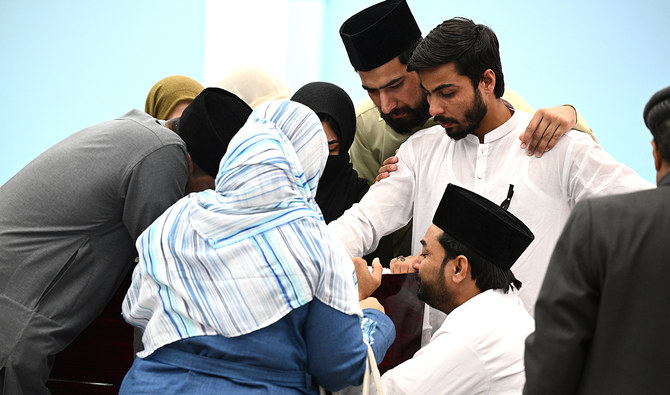
- Faraz Tahir, 30, was the only male killed in fatal Sydney knife attack on April 13
- Tahir’s was working his first day shift when Bondi Junction stabbing took place
ISLAMABAD: The family of Faraz Tahir, a 30-year-old Pakistani security guard killed in a deadly shopping center knife attack in Sydney this month, said he had been “joyous” about making a new life for himself as a refugee in Australia.
Six people were killed and 12 hurt when 40-year-old Joel Cauchi stabbed citizens at the Westfield Bondi Junction on April 13 in one of the city’s worst violent crimes in recent years. Among the dead were five women and Tahir, a refugee from Pakistan who worked as a security guard at the ball.
Police have said the man who fatally stabbed the six people seemed to have targeted women, as the attacker’s family has opened up about Cauchi’s long history of mental illness and frustrations with women.
Mass killings are rare in the country of about 27 million people, which has some of the world’s toughest gun and knife laws.
Speaking to the media, Tahir’s brother Mudasar Bashir said the day he was killed was the first time he was working the day shift.
“We are very proud of him because Islam, our religion, says that if you save even one human, you save all of humanity,” Bashir said.
“So he saved, I don’t know how many people he saved in that time. I think there are lots of people.”
He said Tahir was happy to have moved to Australia from Pakistan.
“He was very happy, he was joyous,” Bashir said. “So, every time he was saying that ‘I am happy here, it’s a very good place. At least I can pray, I can go to my mosque’.”
Bashir last spoke to his brother the night before the attack.
“Night [before the attack] we spoke and he said that ‘I have a job, let me sleep, it’s nighttime’,” Tahir’s brother said. “I said, ‘Okay don’t worry, sleep. We’ll talk tomorrow.’ And it was the last time we spoke with him.”
With inputs from Reuters









